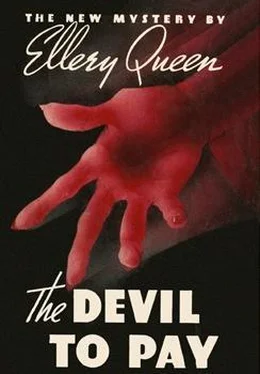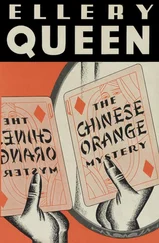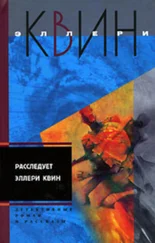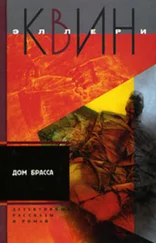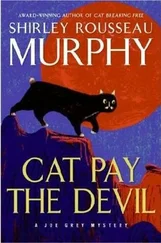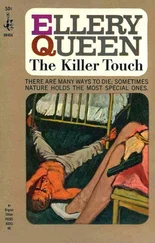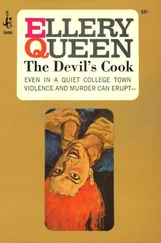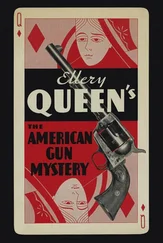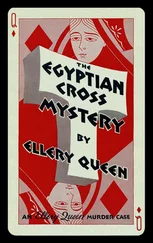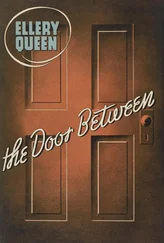He had remembered the call, too.
Walter, she cried silently, why did you lie? What are you hiding?
A tall man bustled in lugging a kit.
“Bronson!” said Dr. Polk, the wrinkles on his forehead vanishing. “Glad you’re here. I want you to have a look at this.”
The Bureau Chemist hurried with the coroner’s physician to the ell beside the fireplace. The detectives closed in.
“Go on home,” said the Inspector bruskly to Walter. “I’ll talk to you again in the morning. Unless you want to stay here?”
“No,” said Walter, without moving. “No, I don’t.”
Then he very quickly got out of the chair and groped for his hat and made for the corridor, stumbling once over a fold in the rug. He did not look at the Jardins.
“You can go, too — Miss Moon, Mr. Ruhig. And you, there, whatever your name is.”
But Pink said: “How about taking a jump in the lake?”
“Can’t... can’t my father and I leave, Inspector?” asked Val, staring at the doorway through which Walter had fled. Then she closed her eyes, because Mr. Ruhig was piloting the exquisite Miss Moon deferentially through the same doorway, somehow spoiling the view.
“No,” said Glücke curtly.
Val sighed.
The Inspector strode over to the group near the fireplace and Mr. Queen, unable to restrain his curiosity, hurried after him and peered over his shoulder to see what was going on.
Solly Spaeth was uncovered again. The Chemist knelt over him intently studying the brownish mouth of the stab-wound. Twice he lowered his long nose to the wound and sniffed. Then he slowly shook his head, looking up at Dr. Polk.
“It’s molasses, all right,” he said in a wondering voice.
“That’s what I thought,” replied Dr. Polk. “And it’s not only at the mouth of the wound, but seems to coat the sides for some way in.”
“Molasses,” repeated the Inspector. “That’s a hell of a note... Say, stop shoving me!”
Ellery rubbed his bearded cheeks. “Sorry, Inspector. Molasses? That’s exciting. Did I hear you say, Doctor, the point just missed the heart?”
The doctor regarded him with curiosity. “Yes.”
Ellery shouldered Glücke out of the way and pushed through the group until he was standing directly over the dead man.
“Was the stab-wound serious enough to have caused death?”
“He’s dead, isn’t he?” growled the Inspector.
“Undoubtedly, but I’ve a faint notion things aren’t quite as they seem. Well, Doctor?”
“Hard to say,” frowned the coroner’s physician. “There wasn’t much bleeding. Given an hour or so, he probably would have bled to death — that is, without medical attention. It certainly is queer.”
“So queer,” said Ellery, “that I’d have Mr. Bronson analyze the molasses.”
“What for?” snarled Glücke.
“The molasses and its physical disposition in the wound,” murmured Ellery, “suggest that it must have been smeared on the point of the blade that made the wound. Why smear molasses on a cutting edge? Well, molasses is viscid. It could be constructed as the ‘binder’ of another substance.”
“I see, I see,” muttered Dr. Polk. “I hadn’t thought of it just that way, but certain indications—”
“What is this?” demanded the Inspector irritably.
“It’s only a suggestion, respectful and all that,” said Ellery with a placative smile, “but if you’ll have Mr. Bronson test that molasses for poison — some poisonous substance that comes in solid rather than liquid form — I think you’ll find something.”
“Poison,” muttered Glücke. He stroked his nose and glanced fretfully at Ellery out of the corner of his eye.
The Chemist carefully scraped a scum of molasses from the wound and deposited it on a slide. Then he opened his kit and went to work.
Molasses. Poison. Val closed her eyes.
“Potassium cyanide,” announced Bronson at last. “I’m pretty sure. Of course, I’ll have to get back to my lab before I can make it official.”
“Cyanide!” exclaimed Dr. Polk. “That’s it.”
“Comes in powder form, of course — white crystals,” said the Chemist. “It was thoroughly mixed into the molasses — a good deal of it, I’d say.”
“Paralyzes certain enzymes essential to cellular metabolism,” muttered the doctor. “Death within a few minutes. He’d have died before complete absorption, so the tissues through which the blade passed ought to reveal traces of the poison in autopsy.” He shrugged at the dead man’s gray-fringed bald spot. “Well, it was a painless death, anyway.”
“Isn’t any one going to congratulate me?” sighed Ellery.
Glücke glared at him and turned his back. “We’ll have to get busy on that cyanide,” he snapped.
“I’m afraid you won’t be very successful,” said Bronson, packing his kit. “It’s too common — used commercially in dozens of ways — film manufacture, cleaning fluids, God knows what else. And you can buy it at any drug store.”
“Nuts,” said the Inspector, plainly disappointed. “Well, all right, Doc, get him out of here. Let’s have your report the first thing in the morning, if you can make it.”
Ellery backed off as the detectives milled about and Dr. Polk superintended the removal of the body. He seemed worried about something.
“Oh, Dr. Polk,” he said as the coroner’s physician was about to follow Solly’s remains through the doorway. “Does the condition of the body confirm the time of death as indicated by the wrist-watch?”
“Yes. The man died of cyanide poisoning, not of stabbing, and within a very short time after the blow. From the local conditions in this room and the state of the corpse, calculating roughly, he figures to have passed out around 5.30. And the watch says 5.32, which ought to be close enough for any one... Smart work, Mr. Queen. Detective, eh?”
“Enough of one,” sighed Ellery, “to detect traces of hostility in the official atmosphere. Thanks, Doctor.” And he watched Dr. Polk and Bronson depart.
“May we go now, Inspector?” asked Val again, examining the freckle on her left ring-finger. There had been something unpleasant about Solly’s quiet contour under the morgue sheet, and there was a vast desire within her to go somewhere and consume sherry frappés.
“When I’m through with you. Here,” roared Glücke, “what are you doing now, damn it?”
Ellery had dragged a chair over to the fireplace and was engaged in standing on it while he made mysterious movements with his body. He looked, in fact, as if he meant to emulate Dracula and climb the fireplace wall.
“I’m trying,” he said in a friendly tone, stepping down, “to find the answer to three questions.”
“Listen, Queen—”
“First, why did your murderer employ that particular sword for his crime?”
“How the hell should I know? Look—”
“Why,” continued Ellery, going close to the fireplace and raising his arm to the wall above it, “why didn’t he take down this needle-bladed French dueling sword?”
“I don’t know,” barked Glücke, “and what’s more I don’t give a damn. If you’ll be kind enough—”
Ellery pointed. “See where that dustmark on the wall is — where the missing rapier hung. Now, no man could possibly have reached that rapier without standing on something. But why haul a chair over here to reach a cup-hilted Italian rapier of the seventeenth century when you have merely to stand on the floor and extend your arm and reach a nineteenth-century French dueling-sword which will do the work equally well?”
“That’s an odd note in an unpremeditated crime,” said Rhys Jardin, interested despite his preoccupation.
“Who asked you?” said the Inspector, exasperated.
Читать дальше
